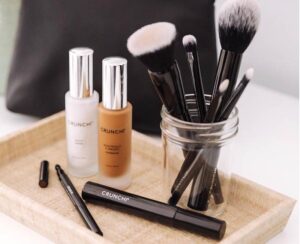I see it time and time again with women:
She’s trying a new diet or protocol, maybe she loses a little bit of weight but then gets stuck. She’s tired, sometimes downright exhausted. She is exercising her buns off (except for that her buns don’t seem to be responding very well) OR she’s too tired to exercise. She has little sex drive. She has brain fog and just feels like she’s “not herself”. Sleep might be an issue as well; either having difficulty falling asleep or falling asleep only to wake later and stare at the ceiling. Maybe she thinks she’s getting enough sleep but then relying on caffeine to push her through her day…
Stop right there, sister. Let me give you permission to just breathe, perhaps cry if you need to.
Understand that trying to beat your body into submission with “diet” and tons of exercise or getting down on yourself because of lack of energy and motivation is just not going to help. In fact, I can assure you these tactics will make things worse.
The problem is that a lot of our mainstream/cookie cutter approaches to health and weight loss target surface level “stuff” rather than getting to the root of the issue.
What does this mean?
If my car is not running right because of an issue with the engine, filling it with more gas will not help. Driving my car more and hoping the issue will resolve itself will cause a faster breakdown. Changing the oil or using a different kind of gas won’t even help if what is going on is internal.
Why do we think stressing our bodies out will equal long term health? It never works.
Rather than climbing back on that frantic hamster wheel that leads to nowhere, let’s step off for a minute and tune into what your body is telling you.
If you are exhausted, not sleeping well, feeling like your head is in the clouds and you can’t focus, your body seems to do the opposite of what you want it to, you think you might just not be able to function at all without caffeine, your moods suck… THERE IS A REASON FOR ALL OF THIS…and, sorry friends, as much as I love KETO, it won’t solve the problem either.
There are THREE major players in our health and wellbeing that us women really need to be familiar with because they run the show!!
Cortisol, Thyroid and Sex Hormones (Estrogen, Progesterone and Testosterone)
These 3 have a very tight relationship. You cannot mess with one without another being impacted. But, the truth is that it really all stems from Cortisol. That’s where it starts and cascades down from there.
CORTISOL is good, until it’s not.
Cortisol is a steroid hormone made in the adrenal glands. Most cells within the body have cortisol receptors. It is known for helping fuel your body’s “fight-or-flight” instinct in a crisis, but cortisol plays an important role in a number of things your body does, such as:
- Managing how your body uses carbohydrates, fats, and proteins
- Controlling inflammation
- Regulating blood pressure
- Increasing blood sugar (glucose)
- Controlling your sleep/wake cycle
- Boosts energy so you can handle stress and restores balance afterward
This is how cortisol works when things are going well. However, in our modern-day culture, most of us deal with a boatload of stress on a normal basis. STRESS comes in the form of mental/emotional, chemical or physical. This is critical to understand. Stress is not just being overworked, fighting traffic, dealing with financial issues or a boss you hate… stress comes from the toxins we put into our body constantly (from food, body products, makeup, detergents, etc), infections, over or under exercising, being “plugged in” all the time with all the technology we rely on, etc.
According to Dr. Sara Gottfried, “high cortisol levels wreak havoc over time, and make you store fat—especially in your belly, deplete your happy brain chemicals like serotonin, and rob your sleep. High cortisol is also linked to depression, food addiction, and sugar cravings”.
Notice above that one of the things cortisol is responsible for is increasing blood sugar. So, when my body is stressed for whatever reason, it releases cortisol in order to help me with added energy so I can deal with that stress. What then happens is that my blood sugar stays elevated, and insulin comes into play as well. This is a very hard battle to fight because what people typically do at this point is exercise harder and reduce calories. Guess what your body thinks with this?? STRESS. Up goes the cortisol and the crazy cycle continues.
TESTING CORTISOL
You can for sure go to your doc and ask for a blood cortisol test. This is fine and will help give you a little idea of some imbalance. HOWEVER, when you go to have a cortisol test run first thing in the morning, you are A) getting up, out of bed, getting ready and driving to have your test run so it’s not a true representation of waking cortisol. B) if you are anything like me just the thought of having a needle poked into my arm STRESSES ME OUT! So, you could have low cortisol but that might not show from the test if your cortisol spiked! C) our cortisol has a natural rhythm throughout the day. It goes up and down and there are optimal levels morning, noon and night. Therefore, testing once doesn’t give you a very full picture of what’s happening.
What I recommend: a four-point cortisol test with saliva. This one is a much better indicator of what is happening with your cortisol as it pinpoints patterns throughout a 24-hour period.
THYROID regulates pretty much every cell in the body. It is the boss of the metabolism! If you have a slow thyroid you might experience brain fog, fatigue, weight gain, hair loss, low sex drive, depression, etc.
It is critical to understand that thyroid symptoms present differently in each person and occur in stages. It is quite obviously best to catch an issue early on when symptoms are few and low rather than wait until things are worse and hard to turn around. It is up to YOU to get clear on this and advocate for yourself because, sadly, most mainstream medical doctors will not consider thyroid an issue until your numbers are dramatically out of range (for which they have a pill). This is 100% not necessary! You can absolutely detect when a problem is starting and make efforts to support your thyroid and reverse your condition!
TESTING THYROID
TSH (thyroid stimulating hormone): secreted by the pituitary gland in the brain when your brain detects you need more thyroid hormone. THIS IS NOT YOUR ACTIVE THYROID HORMONE! This is simply where your thyroid hormone is initiated from. At this point, when your TSH is released, you feel nothing; energy and metabolism are not impacted by TSH.
Free T4: triggered by TSH, T4 is really just a messenger. The release of T4 still does not impact your energy and metabolism! It must be converted into T3 which is where the magic happens. FREE simply means you are measuring the part of the hormone that is being used in your body. You can have more T4 swimming around but if it isn’t available to convert to T3, it doesn’t matter.
Free T3: this is our ACTIVE thyroid hormone! Sadly, doctors RARELY test this one. You MUST ASK to have this tested. If you are told no, ask again. You will likely hear all sorts of excuses as to why they won’t test it (such as it is not an important number) but stick to your guns with this. Your TSH and T4 can be “normal” but if your Free T3 is low, you’ll know it because you’ll feel like crap! However, without testing this your doctor will say “you’re fine” and send you on your way.
Reverse T3: this is another that is rarely tested. This one is important because it is a trickster. It is essentially an inactive form of T3 that gets released when high stress occurs (low calorie diets and over exercising are a huge cause of this!!). RT3 will take the place of Free T3 in thyroid receptors, not allowing the active hormone to do its job.
Thyroid Antibodies (Thyroid Peroxidase Antibodies (TPOAb) and Thyroglobulin Antibodies (TgAb): these antibodies will be elevated when your immune system is attacking your thyroid. They are indicative of Hashimoto’s Disease (hypothyroid) and Graves Disease (hyperthyroid). These are so important to test because it will dictate your approach to supporting your thyroid!
SEX HORMONES are the third piece of this puzzle and are directed by cortisol and thyroid. If you have an imbalance here, it is quite likely due to an upstream issue.
For women estrogen is typically what we relate to. However, our progesterone and testosterone are both just as important and impactful. In fact, the relationship between progesterone and estrogen matters more than the individual levels of either of them.
For example:
If your estrogen is low, but your progesterone is lower, you will experience symptoms of ESTROGEN DOMINANCE. This can even happen if your progesterone is at a more optimal level. If your estrogen is dominating the situation, that is what you will experience.
According to Dr. Christiane Northrup here are symptoms of estrogen dominance:
- Decreased sex drive
- Irregular or otherwise abnormal menstrual periods
- Bloating (water retention)
- Breast swelling and tenderness
- Fibrocystic breasts
- Headaches (especially premenstrually)
- Mood swings (most often irritability and depression)
- Weight and/or fat gain (particularly around the abdomen and hips)
- Cold hands and feet (a symptom of thyroid dysfunction)
- Hair loss
- Thyroid dysfunction
- Sluggish metabolism
- Foggy thinking, memory loss
- Fatigue
- Trouble sleeping/insomnia
- PMS
Progesterone is a calming, protecting hormone. It gives us our sense of well-being and balance by helping us deal with stress better and feel more grounded.
Testosterone is one that is often neglected because we think of it more as a male hormone. However, us girls need it too! The tricky thing is that we need enough, but not too much. Too much and we run into things like PCOS (polycystic ovary syndrome) and other issues.
Although I mention testosterone here, it’s really about ANDROGENS in general (DHEA, a precursor to testosterone; androstenedione, related to both testosterone and estrogen; DHT, converted from testosterone). One of the biggest issues with androgens is that when they are in excess then will cause insulin resistance.
With too little testosterone we can experience these symptoms according to Dr. Becky Campbell:
- Fatigue
- Poor memory
- Dry skin
- Gaining weight around the midsection
- Osteoporosis
- Having a hard time keeping muscle on
- Low libido
- Depression and or anxiety
Do you see how all of these things have so many cross overs?? One thing can look like 10 other hormonal imbalances. That is why it is so important to TEST, NOT GUESS! Sometimes things are obvious, but a lot of the time it’s just not and you don’t want to be taking shots in the dark when it comes to your health! What can happen is that a bigger imbalance or more symptoms can occur on top of what you are already dealing with.
What test results mean!
Another important thing to note is that even if you get your doctor to order ALL of the necessary labs, they are most often compared to “standard ranges”. Please LISTEN UP! Standard really means “an average of all the labs from people who feel like a big pile of CRAP”. Most people who go in to the doctor to have their labs drawn are doing so because they don’t feel good, are gaining weight, have no energy, are at their wits end, RIGHT?! YES! The “standard ranges” are an average of all of these labs!!
STOP. Think about what you just read. I am a 42 year old female. I want to know where my numbers should be compared to a 42 year old female at her OPTIMAL HEALTH. I do not want to be compared to a pile of 42 year old females who are feeling like they’ve been run over by a truck and hoping someone will come along with a spatula and scrape them up off the road!
If I go into my doctor’s office, she runs my labs and they comeback “within range” according to those standard numbers, she will pat me on the back, tell me I’m “normal” and send me home STILL FEELING LIKE CRAP!
IGNORE THE STANDARD RANGES!
Here are some more optimal ranges to compare your labs to:
CORITSOL:
Optimal blood ranges
(morning) 10-15 μg/dL
(afternoon) 6-10 μg/dL
Optimal saliva ranges
(morning) 3.7-9.5
(noon) 1.2-3.0
(evening) 0.6-1.9
(night) 0.4-1.0
THYROID:
TSH 1-2 UIU/ML or lower (Armour or compounded T3 can artificially suppress TSH)
FT4 >1.1 NG/DL
FT3 > 3.2 PG/ML
RT3 less than a 10:1 ratio RT3:FT3
TPO – TgAb – < 4 IU/ML or negative
SEX HORMONES:
Estradiol (serum) Day 3: < 80 pg/mL; Day 14: 150-350 pg/mL; Postmenopause, approx. 50 pg/mL for bone strength
Progesterone (serum): Luteal phase (day 21-23) 15-33 ng/ml
Free Testosterone (1.1-2.2 pg/ml
Ok. You have your results, you have some imbalances as suspected. Now what?
The “now what” is an extremely individualized situation! There is absolutely no ONE SIZE FITS ALL remedy for all of this because our bodies are remarkably different, the cause of imbalances will vary wildly, labs themselves will be completely different from one person to the next.
Also, our situations are going to be all over the place depending on age, level of stress, any gut issues or infections, current medications, etc.
If you are interested in getting some one-on-one help with this stuff, taking a deeper dive and unraveling YOUR story and creating a NEW STORY, please connect with me! I would love to extend an offer for a complimentary consultation to see where and how I might be able to join forces with you and help you reach a place of more optimal health! Simply schedule a consultation with me here! Or email me at jess@healthwithjess.com




